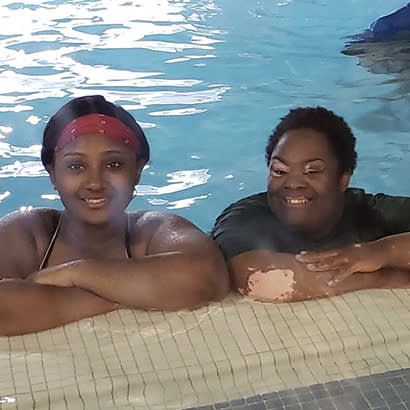
For an enhanced digital experience, read this story in the ezine.
When we focus on an individual’s gifts and values they can share with their community, we take the first step in facilitating and fostering a friendship based on a mutual interest that two people share.
We live in a world where isolation and loneliness are becoming an increasing challenge for all communities, and especially for people with disabilities. Creating opportunities for friendships and genuine connection is important now more than ever. Recreation can provide the perfect environment for this to happen.
Loneliness
Even before the coronavirus (COVID-19) pandemic, isolation and loneliness were experienced by people with disabilities at a considerably higher rate than their non-disabled peers. Thus, it is crucial that we work to create opportunities for social connectedness and belonging.
Prior to COVID-19, 45 percent of people with intellectual disabilities reported feeling lonely — that is compared to only 10.5 percent of the general population. This has only elevated the level of disconnectedness.
It has been said that an antidote for loneliness is friendship; however, having friends is not achieved as easily for people with disabilities. Compared to the general population, people with disabilities have fewer friends, less social support and are more socially isolated.
Research has shown that children with disabilities engage in less physical activity compared to their typically developing peers. By supporting children with disabilities to participate in community sports and activities, children gain activity-specific skills, group participation skills, self-esteem, increased independence and opportunities to engage in positive peer interactions.
Inclusive recreation provides an ideal setting for this to occur. An instructor is uniquely positioned to begin the connection that could lead to an authentic friendship between a person with, and a person without, a disability.
Friendships
Friends are good for our health; they help celebrate good times and are supportive during bad times. Friends inhibit loneliness and give a reciprocal opportunity to also offer needed companionship. Friends also can increase a person’s sense of belonging and purpose, boost happiness and reduce stress.
Why Recreation?
We participate in recreational opportunities with others because of common interests. Recreational activities present perfect opportunities and foundations for a friendship to be built. Work and school environments focus on intelligence and productivity, and measurements associated therewith, thereby creating separation or labels. Recreation is fun. Everybody possesses the ability to have fun, feel fun and experience fun. It is what people choose to do with their time, and where people want to spend their time.
Recreational settings offer an ideal opportunity to foster friendships. Opportunities for meaningful connection should be created in a way that leads to friendship between peers, both with and without disabilities.
Friendship doesn’t always just happen. It calls for proactive steps by instructors and administrators alike. It not only requires creating a welcoming and accessible environment for people with disabilities to participate, but also intentional actions to foster authentic peer relationships. This creates a culture where someone transitions from simply participating to a place of actually belonging.
Lisa Drennan is Founder of MERGE Diverse Abilities Inclusion Consulting.


